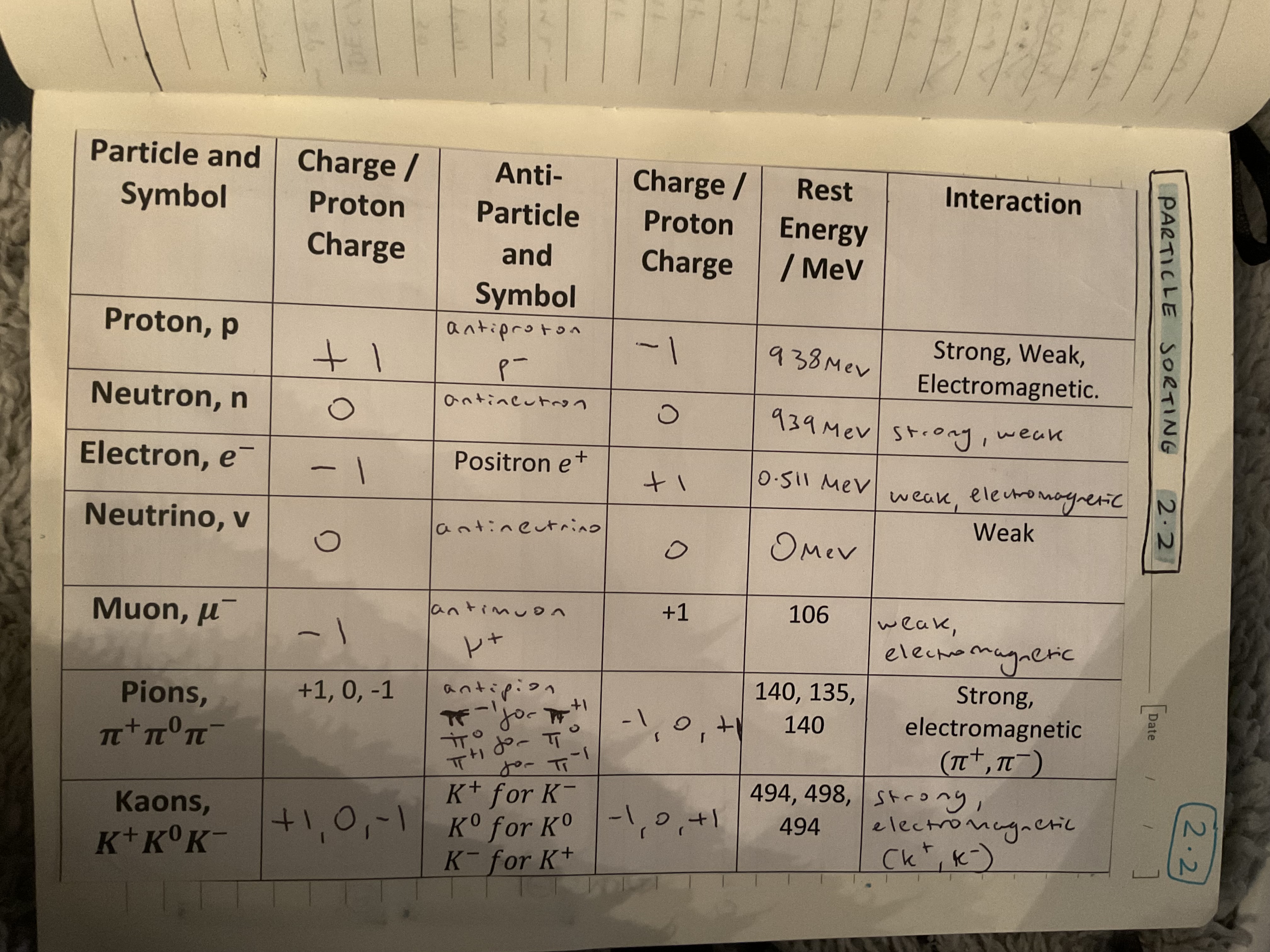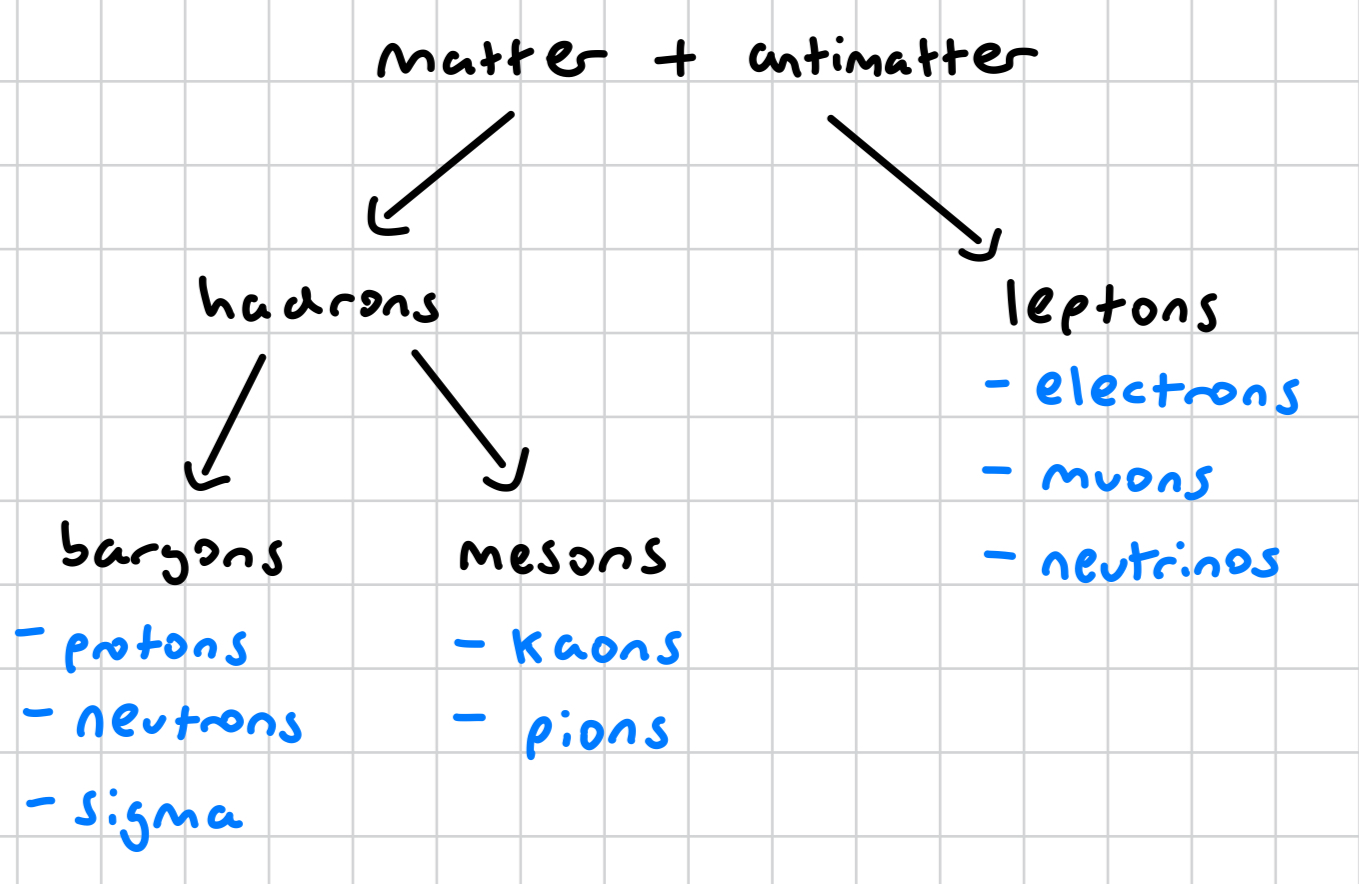2.2 - particle sorting
1/42
There's no tags or description
Looks like no tags are added yet.
Name | Mastery | Learn | Test | Matching | Spaced | Call with Kai |
|---|
No analytics yet
Send a link to your students to track their progress
43 Terms
charge of particles and antiparticles

what is the rest energy of a proton?
938 MeV
what is the rest energy of a neutron?
939 MeV
what is the rest energy of an electron?
0.511 MeV
what is the rest energy of a neutrino?
0 MeV
what is the rest energy of a muon?
106 MeV
what is the rest energy of a pion+ ?
140 MeV
what is the rest energy of a pion0 ?
135 MeV
what is the rest energy of a pion- ?
140 MeV
what is the rest energy of a kaon+ ?
494 MeV
what is the rest energy of a kaon0 ?
498 MeV
what is the rest energy of a kaon- ?
494 MeV
which interactions are protons involved in?
strong nuclear
weak nuclear
electromagnetic
which interactions are neutrons involved in?
strong nuclear
weak nuclear
which interactions are electrons involved in?
weak nuclear
electromagnetic
which interactions are neutrinos involved in?
weak nuclear
which interactions are muons involved in?
weak nuclear
electromagnetic
which interactions are pions involved in?
strong nuclear
electromagnetic (π+ / - )
which interactions are kaons involved in?
strong nuclear
electromagnetic (K+ / - )
what are hadrons?
particles / antiparticles that can interact via the strong interaction:
protons
neutrons
mesons (pions and kaons)
including all antimatter
are mesons hadrons or leptons?
mesons, because they can interact via the strong interaction
what are leptons?
particles / antiparticles that CANNOT interact via the strong interaction:
electrons
muons
neutrinos
including all antimatter
how do hadrons interact?
via all 4 interactions;
weak nuclear
strong nuclear
gravitational
electromagnetic (if charged)
how do leptons interact?
via all interactions but strong nuclear;
weak nuclear
gravitational
electromagnetic (if charged)
how do hadrons tend to decay?
via the weak interaction (apart from protons which are stable)
which is the only hadrons that doesn’t decay via the weak interaction? why?
protons, because they are stable
are protons a hadron or lepton?
hadron
are neutrons a hadron or lepton?
hadron
are pions a hadron or lepton?
hadron
are kaons a hadron or lepton?
hadron
are mesons a hadron or lepton?
hadron
are electrons a hadron or lepton?
lepton
are muons a hadron or lepton?
lepton
are neutrinos a hadron or lepton?
lepton
what are baryons?
protons or all other hadrons that decay into protons (either directly or indirectly);
protons
neutrons
sigma
what are mesons?
hadrons that do NOT include protons in their decay products
kaons
pions
particle and antiparticle flow chart

what are hadrons composed of?
smaller particles called quarks and antiquarks
what is the total energy of particles / antiparticles before collision?
their rest energy + their Ek
what is the total energy of particles / antiparticles after collision?
their rest energy + their Ek
how do you find the rest energy of the products?
total energy before - Ek of products
(because conservation of energy)
do decays follow the laws of conservation?
yes
do collisions follow the laws of conservation?
yes